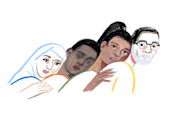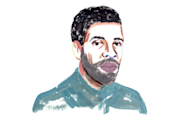Asexuality is an umbrella term encompassing a variety of asexual—also called “ace” or “aces”—identities.
Ace or asexual people may have little or no interest in having sex, even though many do desire emotionally intimate relationships and friendships.
Asexuality exists on a spectrum, and you may hear it referred to as the "ace spectrum."
In the LGBTQIA+ acronym, asexual individuals are represented by the letter "A."
Here's the full meaning of LGBTQIA+, in case you're wondering.
Asexuality exists on a spectrum, and you may hear it referred to as the "ace spectrum."
If you're curious and unsure about asexual identities, or even wondering whether you might be asexual, the Monarch Directory by SimplePractice can help you find therapists who specialize in work with aces and other members of the LGBTQIA+ community.
In the LGBTQIA+ acronym, asexual individuals are represented by the letter "A."
To help increase understanding of what it means to be an asexual person and better define asexuality, we'll dig into into some of the different asexual identities and debunk some persistent—and harmful—myths about asexuality below.
Understanding some asexual identities on the ace spectrum
Aces, and all the asexual identities within the ace community, can be misunderstood.
Within the ace spectrum, there are many ways to identify—including grey-asexual, demisexual, queerplatonic, and aceflux.
Grey-asexual, also known as Grey-A
Grey-A is a broad term that encompasses individuals who identify somewhere in the “grey area” between asexual and sexual.
For example, individuals identifying as grey-asexual may sometimes feel sexual attraction, but have a low sex drive. Or they may only feel sexual attraction in very particular circumstances.
Aces, and all the asexual identities within the ace community, can be misunderstood.
Demisexual
Those who identify as demisexual can typically only feel sexual attraction toward someone after forming a strong emotional bond with that person.
Queerplatonic
In a queerplatonic relationship (QPR) two individuals experience a type of non-romantic relationship, where there is an intense emotional connection that goes beyond a traditional friendship.
QPRs can involve co-parenting/cohabitating, and long-term commitment.
Aceflux
People who identify as aceflux are those whose sexuality flows and changes along the asexual spectrum—and sometimes even falls outside the spectrum.

9 harmful myths about aces to debunk
Let's try to clear up the myths and misconceptions you may hear about asexuality, which can be actively harmful to people who define as asexual.
MYTH #1: Asexuality isn’t real
Yes, being asexual is real.
Asexuality is a widely recognized sexual orientation.
A 2019 study estimates 1.7% of "adults identify as asexual."
The most widely cited statistic is that aces make up about 1% of the population, according to the Asexual Visibility and Eduction Network (AVEN).
MYTH #2: Asexuality is the same as celibacy or abstinence
Celibacy and abstinence are choices—asexuality is not.
Celibacy is the decision to refrain from marriage or sex (often for religious reasons), and abstinence is the decision to not engage in sex.
Asexuality refers to a person’s feelings of sexual attraction, as opposed to whether they engage in sex or not.
MYTH #3: Asexuality is a sickness or disorder
Asexual people are not ill.
Many confuse asexuality with Hypoactive Sexual Desire Disorder and Female Sexual Interest Arousal Disorder, but it is unrelated.
Asexuality is part of a person’s identity, and not the result of an illness.
MYTH #4: Asexuals have no libido
Some aces experience sexual arousal, and others do not.
Of those who do, some will masturbate, and some will not.
It depends on the individual, but asexuality does not mean an individual cannot get sexually aroused.
MYTH #5: Aces have sex-negative attitudes
Just as within any other subset of the general public, there are differing attitudes towards mainstream dialogue about sex within the asexual community.
Some aces believe sex and alternative lifestyles should be talked about in mainstream media, and some believe that anything related to sex should be kept behind closed doors.
MYTH #6: Aces never have sex
This is entirely up to the individual.
Some aces are willing to have sex regularly for the benefit of their partner (even if they are apathetic to the act themselves).
Some aces are aromantic, also known as "aro" or "aros," whereas other aces experience romantic attraction.
Others are willing to have sex once in a while, and others refuse to have sex at all.
Many aces choose to partake in sex to form an emotional connection.
MYTH #8: Aces are just naive people who haven’t had sex (yet)
Asexuality does not mean that someone just hasn’t found the “right” person yet.
Aces are generally disinterested in sex and aren’t sexually attracted to anyone of any gender.

MYTH #9: Aces don’t have romantic relationships.
Many aces have happy, healthy romantic relationships. Romantic orientations are different from sexual orientations, and romantic orientations aren’t specific to certain sexual orientations.
Some aces are aromantic, also known as "aro" or "aros," whereas other aces experience romantic attraction.
Aces are also perfectly capable of feeling love and affection for others—however, that love and affection may not (always or ever) be dependent on sexual attraction.
Connect with the ace community and asexual-affirming therapists
To learn more about aces and the asexual community, check out the Asexual Visibility & Education Network (AVEN).
For members of the ace community, finding an LGBTQIA+ affirming therapist can be essential.
The Monarch Directory from SimplePractice aim to make it easier to find a mental health therapist matched to your specific individual needs.
You can quickly and easily search for and find therapists who specialize in working with aces and other members of the LGBTQIA+ community.
READ NEXT: What's Gender Dysphoria?
Need to find a therapist near you? Check out the Monarch Directory by SimplePractice to find licensed mental health therapists with availability and online booking.
Asexuality: Prevalence and associated factors in a national probability sample. (2021). Retrieved from Journal of Sex Research website: https://www.tandfonline.com/doi/abs/10.1080/00224490409552235
Asexuals and Attitudes Towards Sex | The Asexual Visibility and Education Network | asexuality.org. (2021). Retrieved from Asexuality.org website: https://www.asexuality.org/?q=attitudes.html
Female Sexual Arousal Disorder: Symptoms, Causes, And Treatments. (2021). Retrieved from Njsexualmedicine.com website: https://www.njsexualmedicine.com/contents/female-sexual-issues-fcd/low-sexual-desire-arousal-disorders/female-sexual-arousal-disorder
Hypoactive Sexual Desire Disorder. (2018, October 22). Retrieved from https://www.ashasexualhealth.org/hypoactive-sexual-desire-disorder/
Pasquier, M. (2018, June 25). Explore the spectrum: Guide to finding your ace community. Retrieved from GLAAD website: https://www.glaad.org/amp/ace-guide-finding-your-community
Romantic Orientations | The Asexual Visibility and Education Network | asexuality.org. (2021). Retrieved from Asexuality.org website: https://www.asexuality.org/?q=romanticorientation







